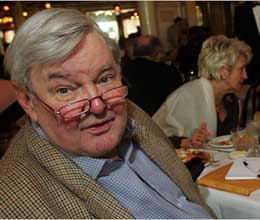 The newsroom at the grey lady, the New York Times, is a little less than it was with the death of the legendary R.W. Apple Jr.
The newsroom at the grey lady, the New York Times, is a little less than it was with the death of the legendary R.W. Apple Jr.
With his Dickensian byline, Churchillian brio and Falstaffian appetites, Mr. Apple, who was known as Johnny, was a singular presence at The Times almost from the moment he joined the metropolitan staff in 1963. He remained a colorful figure as new generations of journalists around him grew more pallid, and his encyclopedic knowledge, grace of expression - and above all his expense account - were the envy of his competitors, imitators and peers.
He was a reporter's reporter:
There was a reason why reporters told stories about Apple. They recognized many of their own traits in him, grotesquely magnified. The shock of recognition frightened them. Apple was like them, only more blatant. He openly displayed the faults they tried to hide: the insecurity, the ambitiousness, the name-dropping and the weakness for powerful men.
In a fashion true to his craft, he afflicted the comfortable and comforted the afflicted.



